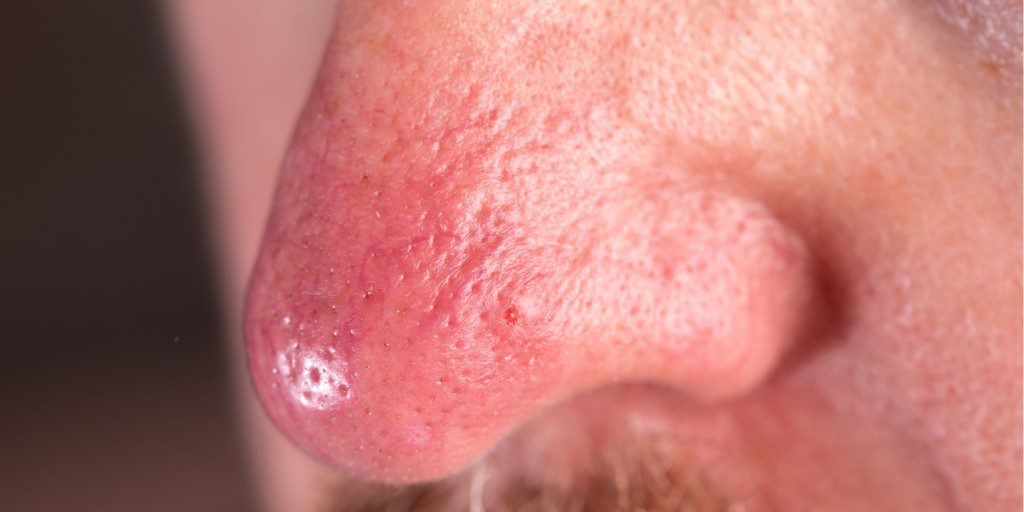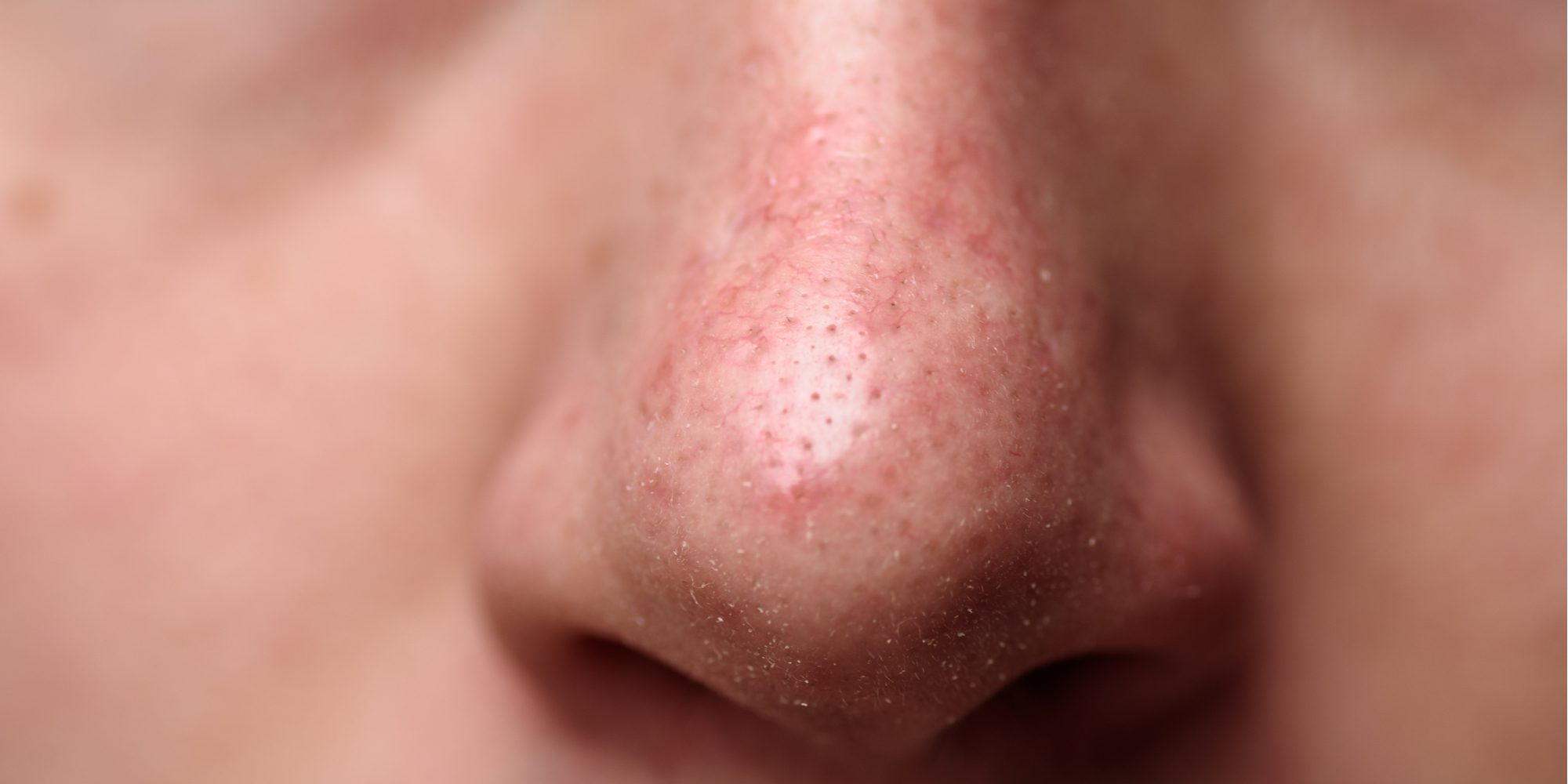There’s often a specific way that alcoholics are portrayed in the media: bumbling, flushed, and with a characteristic red nose. If you look up pictures of this characteristic, you’ll see a variety of red, bumpy, swollen faces. This is known as a drinker’s nose. Other names for it include whiskey nose, gin nose, and drunk nose.
You might have even noticed it on yourself or your friends after a few too many drinks. Does your face feel flushed and get red in appearance when you’re drinking? Most importantly, does it go away once you sober up? Well, there’s a surprising science behind getting a red nose from drinking—and it might be an indication of a more serious problem.
What Is a Drinker’s Nose?

In medical terms, a drinker’s nose is called rhinophyma. This condition is one of the main symptoms of rosacea, which is a dermatological (or skin) disorder that makes the face or other areas of the skin red and bumpy. Rosacea and rhinophyma can make the skin very sensitive and even painful to touch.
It’s important to note that rosacea and rhinophyma are conditions that can happen to anyone, regardless of if they drink or not. However, research indicates that there is a possible connection between rosacea, rhinophyma, and alcohol consumption. In fact, one study came to the conclusion that people who drink have a higher chance of developing rosacea and related conditions.
Most likely, this has to do with the fact that alcohol has an interesting effect on the blood vessels in the face. When alcohol enters the bloodstream, it makes the vessels expand at first and then, after a few drinks, they begin to constrict.
As a result, areas where blood vessels are more likely to be noticed, like the face, can start to change coloration anywhere from a light blush to bright red or even purple. Since the effects of rosacea and rhinophyma can make blood vessels more visible, it makes sense that alcohol can worsen the symptoms of these conditions.
Of course, more research is needed to know the exact link between alcohol consumption and drinker’s nose or other skin conditions. But regardless of the direct cause of rhinophyma or rosacea, experts agree that drinking can act as a trigger and make the condition worse.
Rhinophyma Treatment Options
As of right now, there is no known cure for rhinophyma or drinker’s nose. Rather, this condition can only be managed through skin treatments and taking certain preventative measures to avoid triggers that could exacerbate the symptoms.
In some cases, medications can be a useful way to help reduce the symptoms of a drinker’s nose. In other situations, more serious measures such as surgical procedures are necessary to help clear the skin of the red, irritated bumps. However, many people are able to manage their symptoms of rhinophyma and rosacea simply by avoiding the following triggers:
- Direct exposure to sunlight
- Caffeine
- Spicy foods
- Excessive stress
- Extreme temperatures
- Alcohol addiction
For some people, avoiding these things can come as a challenge, especially if they are struggling with an alcohol use disorder. However, this doesn’t mean that recovering from both an alcohol addiction and drinker’s nose is impossible. Instead, there are specific treatment programs meant to help those who need to safely detox, recover, and maintain a new lifestyle after saying goodbye to alcohol.
Alcohol Addiction Recovery Programs

The medical and mental health professionals at The Blackberry Center in St. Cloud, Florida are familiar with the fact that alcohol addiction is more than just a physical struggle. In addition to the physically-presenting symptoms you may face, such as a drinker’s nose or alcoholic eyes, you might encounter other concerns that impact your self-image, confidence, and ability to be yourself.
If you are hoping to get back on your feet after struggling with an addiction to alcohol and other co-occurring mental health concerns, we’re here to offer you the support and services you need. Typically, we recommend beginning your recovery with our alcohol detoxification program. From there, you will have access to a variety of treatments, including:
- Psychiatric assessment and monitoring
- Dual diagnosis treatment
- 12-step program
- Medication management
- Group therapy
- Nutritional consultations
- Recreational therapy
- Discharge planning
With opportunities like recreational therapy and nutritional education, you can learn more about how to best work with your symptoms of rhinophyma to avoid all potential triggers while still enjoying your favorite meals. Moreover, all of your addiction care incorporates mental health guidance to keep you feeling healthy and happy.
Want more information about your recovery options? Get in touch with us by calling (813) 908-4199 or by filling out our confidential contact form. At the Blackberry Center, our mission is to assist you in achieving all of your recovery goals, step by step. So, what do you want to achieve?
A drinker’s nose is characterized by red, bumpy, or a swollen appearance usually directly on the nose or around the cheeks. In some cases, people can even seem to have a purple nose from alcohol use. This is known as rhinophyma in the medical field.
The stereotype that alcoholics have red noses should be taken with a grain of salt. While some research argues that getting a drinker’s nose might come directly from frequent and chronic drinking habits, other studies show that alcohol does not have much of an effect on the condition of rhinophyma. However, it is true that drinking alcohol can make the blood vessels in the body expand as well as constrict, which can lead to changes in physical appearance such as reddening skin.
Having a flushed appearance after drinking is normal and can go as far as to create that tell-tale drinker’s nose. This is because of how the blood vessels respond to alcohol once it enters the bloodstream. Blood vessels can either expand or constrict depending on how much alcohol one consumes; therefore leading to a red nose or face.

